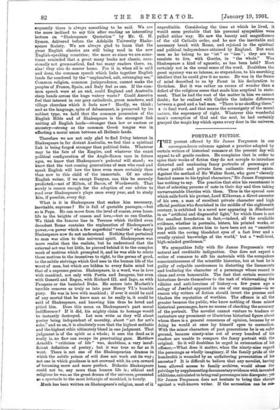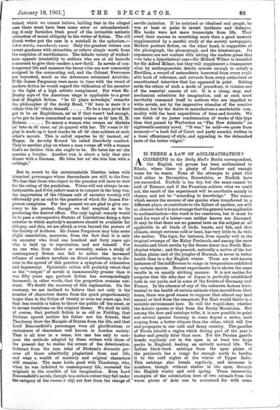PORTRAIT FICTION.
THE protest offered by Sir James Fergusson in our correspondence columns against a practice adopted by certain writers of historical romance at the present day will appeal to all gentle readers. He complains that in order to spice their works of fiction they do not scruple to introduce distorted and unedeasing fancy portraits of personages of whose public and private form authentic record exists. Against the method of Sir Walter Scott, who gave "cleverly fancied names to his typical characters," Sir James Fergusson has nothing to say. The practice that stirs his resentment is that of selecting persons of note in their day and then taking unwarrantable liberties with them. Thus in the special case which calls forth his protest, Lord Kilkerran, a direct ancestor of his own, a man of excellent private character and high official position who flourished in the middle of the eighteenth century, is exhibited in a novel now appearing in Blackwood in an "artificial and disgraceful light," for which there is not the smallest foundation in fact,—indeed, all the available evidence, whether in portraits, letters, his printed works, or his public career, shows him to have been not an "emeritus roué with the roving bloodshot eyes of a fast liver and a cruelly cynical knowledge of the world," but a "well-bred, high-minded gentleman."
We sympathise fully with Sir James Fergusson's very natural and creditable indignation. One does not expect a writer of romance to sift his materials with the scrupulous conscientiousness of the scientific historian, but at best he is guilty of culpable carelessness in distorting the lineaments and traducing the character of a personage whose record is clean and even honourable. The fact that certain eccentric historians devote themselves to the task of whitewashing the villains and anti-heroines of history—a few years ago a eulogy of Jezebel appeared in one of our magazines—is no reason why writers of fiction should invert the process and blacken the reputation of worthies. The offence is all the greater because the public, who know nothing of these minor historical personages, have no means of checking the accuracy of the portrait. The novelist cannot venture to traduce or caricature any prominent or illustrious historical figure about whom there is a general consensus of opinion, because by so doing he would at once lay himself open to correction. With the minor characters of past generations he is on safer ground, because ninety-nine out of every hundred of his readers are unable to compare the fancy portrait with the original. So it will doubtless be urged in extenuation of his offence,—What does it matter, when the ninety-nine regard the personage as wholly imaginary, if the family pride of the hundredth is wounded by an unflattering presentation of his ancestor? It is difficult to believe that any novelist, having been allowed access to family archives, would abuse the privilege by supplementing documentary evidence with invented additions, calculated to bring real personages into disrepute; yet Sir James Fergusson does not hesitate to bring this charge against a well-known writer. If the accusation can be sus,
tabled, which we cannot believe, holding that in the alleged case there must have been some error or misunderstand- ing, it only furnishes fresh proof of the invincible (esthetic attraction of moral obliquity to the writer of fiction. The old Greek writer put the case in a nutshell in the aphorism,—
ia.92tot s-etrrolem-G; zazot. Only the greatest writers can invest goodness with attraction, or relieve simple worth from the suspicion of mawkishness. The infinite variety of wicked- ness appeals irresistibly to authors who are at all hazards concerned to give their readers a new tluill. In novels of con- temporary life and manners the beaux roles are now commonly assigned to the coruscating cad, and the Colonel Newcomes are boycotted, much as the Athenians ostracised Aristides. If Sir James Ferg-usson were more in tune with the trend of modern fiction he would regard the vilification of his ancestor in the light of a high artistic compliment. For what Mr. Dooley says of the American stage is applicable to a great deal of English fiction. "In th' plays nowadays," remarks the philosopher of the Archy Road, "th' hero is more iv a
villain thin th' villain himself To be a hero ye've first got to be an Englishman, an' as if that wasn't bad enough, ye've got to have committed as many crimes as th' late H. H.
Holmes Ye marry a woman who swears an' dhrinks an' bets on th' races, an' ye quarrel with her. Th' r-rest iv th' play is made up iv hard cracks be all th' char-ackters at each other's morale. This is called repartee be th' learned, an' Hogan. In Ar-rchy R-road 'tis called disorderly conduct. They'se another play on where a man r-runs off with a woman that's no betther thin she ought to be. He bates her an' she marries a burglar. Another wan is about a lady that ates dinner with a German. He bites her an' she hits him with a cabbage."
Bat to revert to the unwarrantable liberties taken with historical personages whose descendants are still to the fore. We fear that those who object to the practice will have to wait for the swing of the pendulum. Virtue will not always be un- fashionable, and if the yellow man is to conquer in the long run, the importation of the Chinese cult of ancestor worship will effectually put an end to the practice of which Sir James Fer- gusson complains. For the present we are glad to give cur- rency to his protest, though we feel sceptical as to its producing the desired effect. The only logical remedy would he to pass a retrospective Statute of Limitations fixing a date anterior to which anybody's ancestors should be available for obloquy, and this, we are afraid, is even beyond the powers of the Society of Authors. Sir James Fergusson may take some slight consolation, moreover, from the fact that it is only an ancestor who lived one hundred and forty years ago who is held up to reprobation, and not himself. For no one who, from choice or necessity, makes a study of contemporary fiction can fail to notice the increased reliance of modern novelists on direct portraiture, or to dis- cern in the spread of this practice a symptom of exhaustion and degeneracy. Optimistic critics will probably retort that as the " output " of novels is immeasurably greater than it was fifty years ago, portrait fiction has correspondingly increased; in other words, that the proportion remains con- stant. We doubt the accuracy of this explanation. On the contrary, we are inclined to believe that not only is the number of characters drawn from the quick proportionately larger than in the fiction of twenty or even ten years ago, but that less trouble is taken to throw the public off the scent, or to invent variations on the original theme. We shall be told, of course, that portrait fiction is as old as Fielding, that Dickens spared neither his father nor his friends, that Thackeray drew the Marquis of Steyne from the life, and that Lord Beaconsfield's personages were all glorifications or caricatures of characters well known in London society. That is all true in a sense, but one has only to com- pare the methods adopted by these writers with those of the present day to realise the extent of the deterioration. Subtract from the sum total of Dickens's dramatis per- sona all those admittedly plagiarised from real life, and what a wealth of masterly and original characters still remains. The same holds good with Thackeray, who, when he was indebted to contemporary life, recreated the originals in the crucible of his imagination. Even Lord Beaconsfield's novels, though to a certain extent they fall under the category of the roman a clef, are free from the charge of servile imitation. If he satirised or idealised real people, he was at least at pains to invent incidents and dialogue. His books were not mere transcripts from life. They owed their success to something more than a good memory supplemented by a careful study of the society newspapers. Modern portrait fiction, on the other hand, is suggestive of the photograph, the phonograph, and the kinetoscope. Its exponents are not content with letting the readers guess that —to take a hypothetical case—Sir Milford. Wilner is intended for Sir Alfred Milner, but they will supplement a transparent alias by anthropometric details minute enough to satisfy a. Bertillon, a record of antecedents borrowed from every avail- able book of reference, and extracts from every authorised or unauthorised interview that has appeared in print. Setting aside the ethics of such a mode of procedure, it violates one of the essential canons of art. It is a cheap, easy, and mechanical substitute for imagination, and as such must inevitably commend itself to authors who are impelled to write novels, not by the imperative stimulus of the creative instinct, but by the desire to manufacture a marketable corn. modity with the least expenditure of time and trouble. We can think of no juster condemnation of works of this type than that passed by Warburton on "The New Atlantis," an eighteenth-century noveL "It was," he said—we quote from memory—" a book full of Court and party scandal, written in a loose effeminacy of style, and appealing to the debauched taste of the better vulgar."







































 Previous page
Previous page